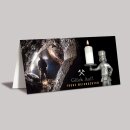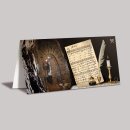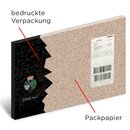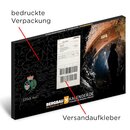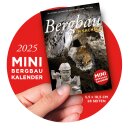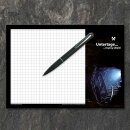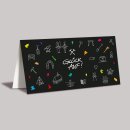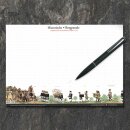Description
Greeting Card Georgius Agricola - Good Luck!
With the Greeting Card Mining - Good Luck! and much success in the new year, you can express your appreciation and best wishes to your colleagues, acquaintances, and business partners at the turn of the year. The card displays an old book with the portrait of Georgius Agricola, a renowned mining pioneer, as well as the depiction of an ancient mine tunnel.
"Even if it could be said of some who invested their fortune in mining without ever seeing any return, there are still not a few who have acquired the greatest riches with very little expense."
The card is made of high-quality paper and measures 21 x 10 cm. The inside is white and offers ample space for personal words and wishes. You can provide the card with handwritten text or a printed greeting. The folding card is easy to open and close, making it suitable for older people or those with limited fine motor skills. In addition to the greeting card, you receive a lined envelope without a window for free. This protects the greeting card during shipping and gives it a special touch. The envelope is also made of high-quality paper and matches the card perfectly.
Design: old book with a portrait of Georgius Agricola and a historical mine tunnel.
Card details
- Format: 21 x 10 cm, landscape
- sturdy cardboard
- very writable
- Printing: one-sided full color
- incl. lined envelope without viewing window, unprinted
- Card is delivered open
- Photos: Jens Kugler
Georgius Agricola, whose real name was Georg Bauer, is one of the most important figures in the history of geology and mineralogy. Born in Saxony, Germany in 1494, he passed away in 1555. Often referred to as the "Father of Mineralogy," Agricola is known for his groundbreaking work in the field of ore mining and metallurgy. He studied at the University of Leipzig and later medicine and natural sciences in Italy.
Upon returning to Germany, he became a city doctor in Chemnitz, where he spent much time researching the local mining industry. Agricola wrote many works, among them "De re metallica" (On the Nature of Metals), considered his magnum opus. It provides a comprehensive and systematic account of mining and metallurgy of his time, including details on mining equipment and techniques. Agricola's work and writings have had a tremendous influence on science, especially the disciplines of geology and mineralogy. His extensive knowledge and detailed observations helped shape and advance the understanding of natural sciences.


